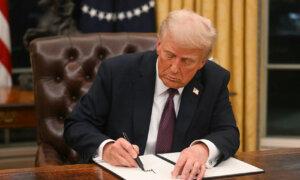Trump Completes Political Comeback, Delivers on First Day Promises
“Starting today, our nation will thrive and regain its esteemed position around the globe,” the president stated.
WASHINGTON—On January 20, President Donald Trump concluded a remarkable political comeback, taking the oath of office at the Capitol surrounded by both prominent supporters and critics.
In his inaugural address, the president outlined an ambitious agenda and revealed a series of executive actions aimed at launching it immediately. He announced national emergencies concerning energy and the southern border, classified Mexican drug cartels as global terrorist organizations, and asserted the United States’ stance that there are two genders.
Reflecting on the extraordinary hurdles he overcame during the campaign—ranging from prosecutions at various government levels to the raid on his Mar-a-Lago residence and two assassination attempts—the president declared, “I was saved by God to make America great again.”
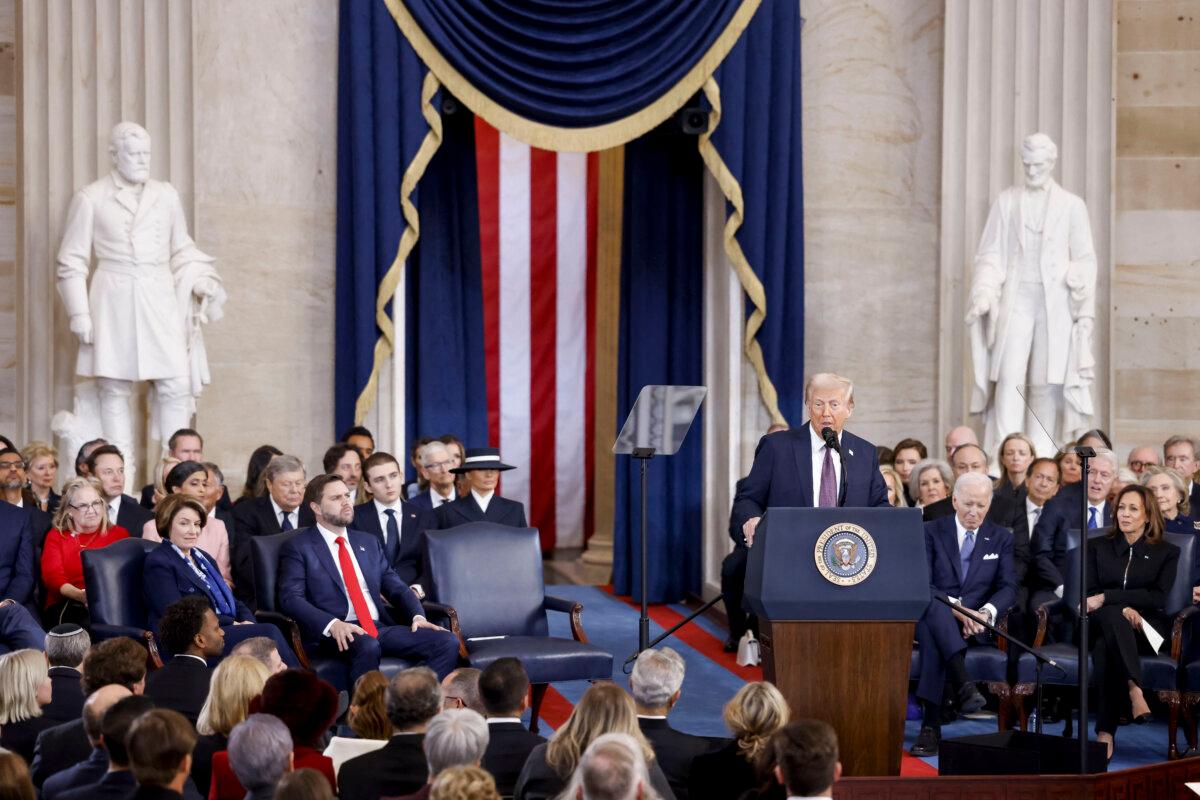
President Donald Trump delivers his inaugural address after being sworn in as the 47th president of the United States inside the Rotunda of the US Capitol in Washington, DC, on Jan. 20, 2025. SHAWN THEW/POOL/AFP via Getty Images
Prior to facing assassination attempts and legal challenges, Trump found himself banned from Twitter, Facebook, and other platforms when he declared his candidacy in November 2022. Illustrating the dramatic shift in his fortunes, the very CEOs of those companies that restricted him sat alongside Trump’s family and Cabinet members during his address.
Unlike his first inauguration, Trump ascended to power having transformed the Republican Party to align with his America-first philosophy. This revival extends beyond politics, as Trump remains at the forefront of the cultural battle both in office and out. Conservatives seemingly have gained the upper hand over the progressive values that have long prevailed. Corporations and governments are increasingly eliminating departments and policies rooted in diversity, equity, and inclusion (DEI) and environmental, social, and governance (ESG) frameworks, which have come to symbolize the advance of progressive ideology into corporate and governmental arenas.
“Many believed it was unfeasible for me to orchestrate such a remarkable political resurgence. But as you can see today, here I stand,” Trump declared. “The American populace has made their choice.”
In his address, Trump highlighted some executive actions he would enact on the same day.
Border policies were at the forefront, with the president indicating he would declare an emergency at the southern border, reinstate the remain-in-Mexico policy, terminate catch-and-release, deploy military and National Guard personnel to the border, designate drug cartels as terrorist entities, and invoke the Alien Enemies Act of 1798 to deport cartel members from the United States. Incoming White House officials confirmed that Trump would be signing executive actions on each of these matters that day.
The president also declared a national energy emergency, which he framed as a necessary response to what he characterized as the former administration’s intentional policies. Included in these orders were provisions to expand drilling in Alaska, terminate the Biden administration’s purported electric vehicle mandate, and replenish the strategic oil reserve. The president would halt federal leases for wind farms, withdraw from the Paris Agreement on climate change once again, and abolish several Biden-era regulations regarding washing machines, light bulbs, and dishwashers.
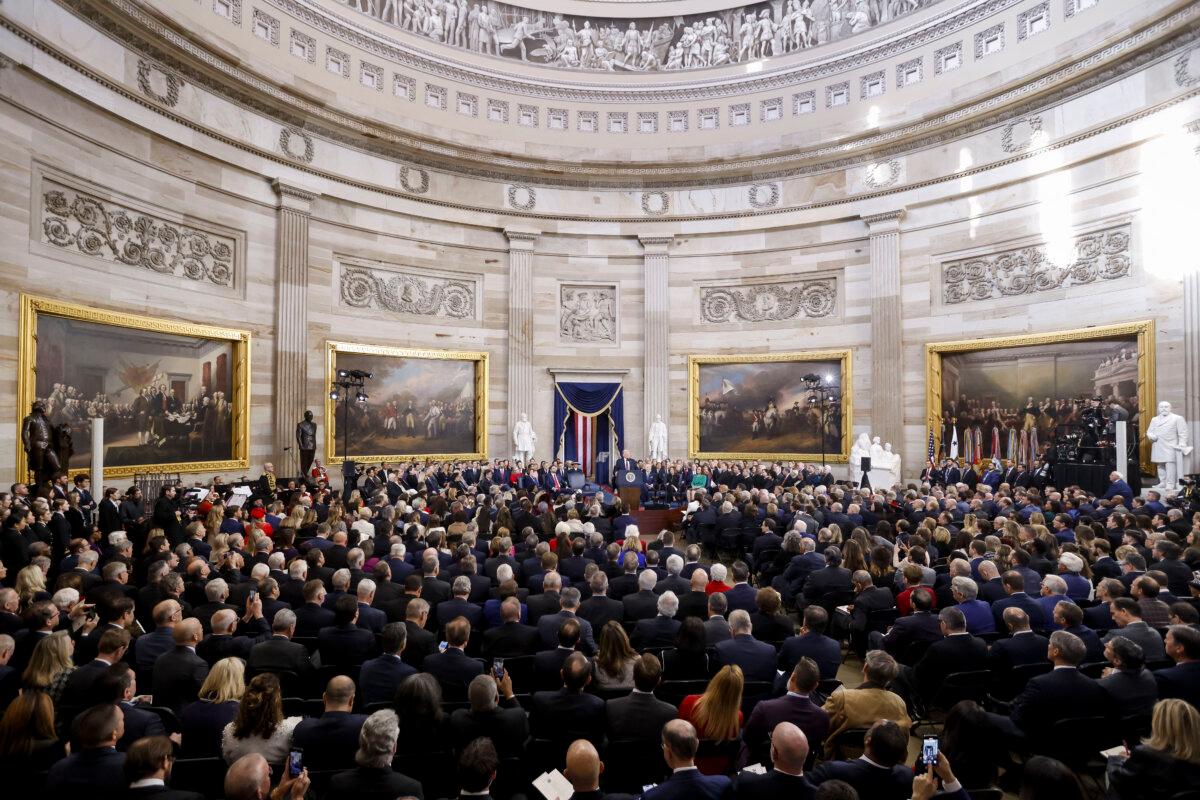
President Donald Trump delivers his inaugural address after being sworn in as the 47th president of the United States inside the Rotunda of the US Capitol in Washington, DC, on Jan. 20, 2025. SHAWN THEW/POOL/AFP via Getty Images
The president stated he would pursue foreign policy initiatives he had introduced during the transition, such as plans to reclaim the Panama Canal, rename the Gulf of Mexico as the Gulf of America, and create the External Revenue Service to manage tariff collection from other countries.
While Trump indicated plans to impose tariffs on Canada, Mexico, and China would come later, he would start the day by directing federal agencies to evaluate unfair trade practices by foreign nations and recommend relevant trade policies.
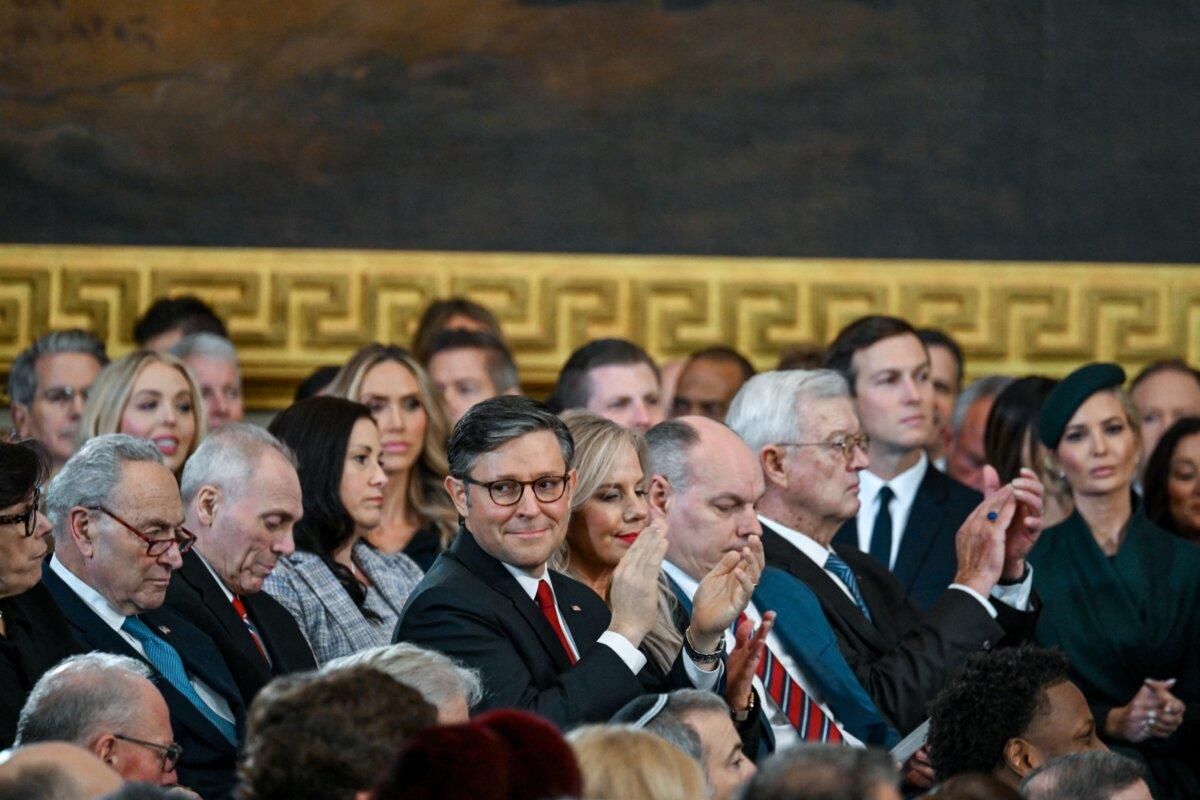
Speaker Mike Johnson listens as President-elect Donald J. Trump speaks after being sworn in during the inauguration of Donald Trump as the 47th president of the United States takes place inside the Capitol Rotunda of the U.S. Capitol building on Jan. 20, 2025. Kenny Holston / AFP
In a broader assessment of the nation, Trump reiterated themes from his campaign, claiming that America is in decline due to the prior administration’s policies. He characterized his speech as a pivotal moment, asserting that the “golden age” of America is now commencing.
“From this day onward, our nation will thrive and regain its global respect. We will be envied by every other country, and we will no longer allow ourselves to be exploited,” Trump proclaimed. “Every day of my administration, I will prioritize America first.”
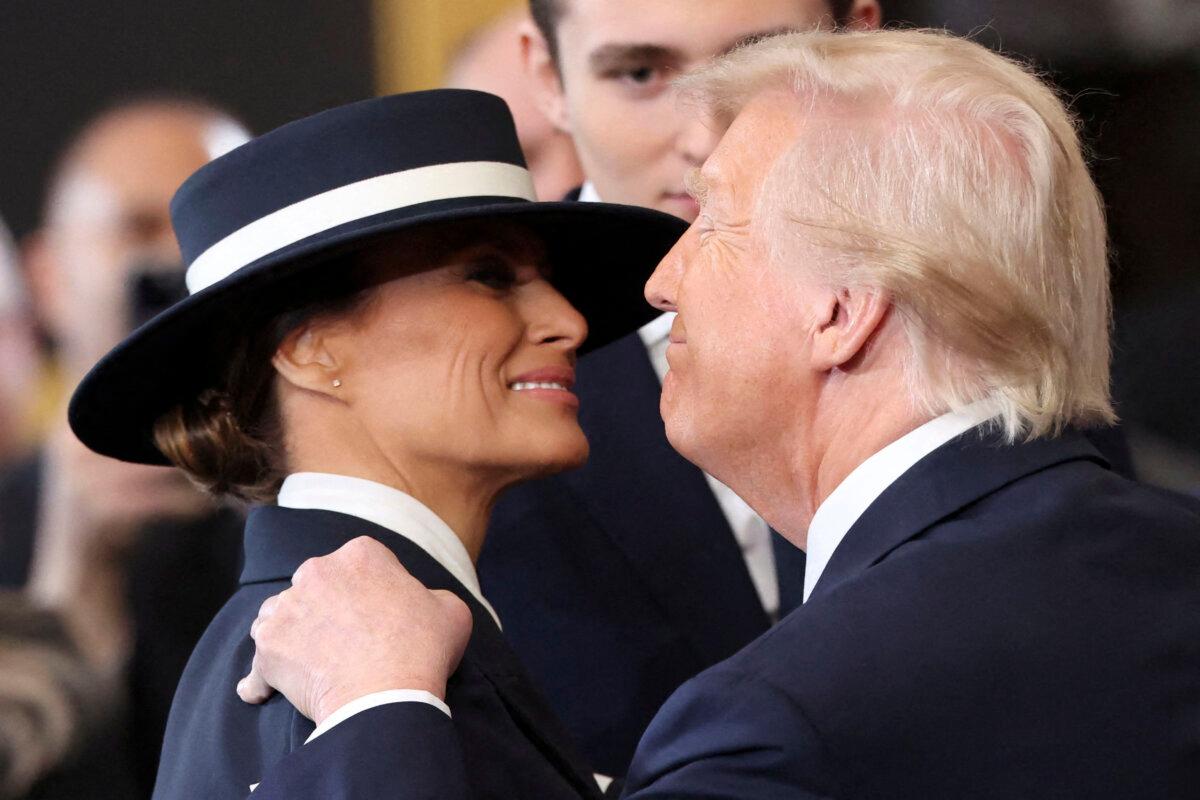
President Donald Trump and First Lady Melania Trump embrace after he was sworn in inside the Rotunda of the US Capitol in Washington, DC, on Jan. 20, 2025. KEVIN LAMARQUE/POOL/AFP via Getty Images
Milley was among numerous individuals who received preemptive pardons from President Joe Biden in the final hours of his presidency. Biden also preemptively pardoned Dr. Anthony Fauci, former director of the National Institute of Allergy and Infectious Diseases, witnesses and members of the January 6 committee, along with several Biden family members.
Following the Capitol ceremonies, Trump and First Lady Melania Trump bid farewell to Joe Biden and former First Lady Jill Biden. In his 2021 inaugural speech, Biden outlined a plan to counter the cultural and political dynamics that Trump had championed. Fast forward four years, Biden departed the capital via helicopter, as Trump enjoyed higher approval ratings than when he left office on January 20, 2021.
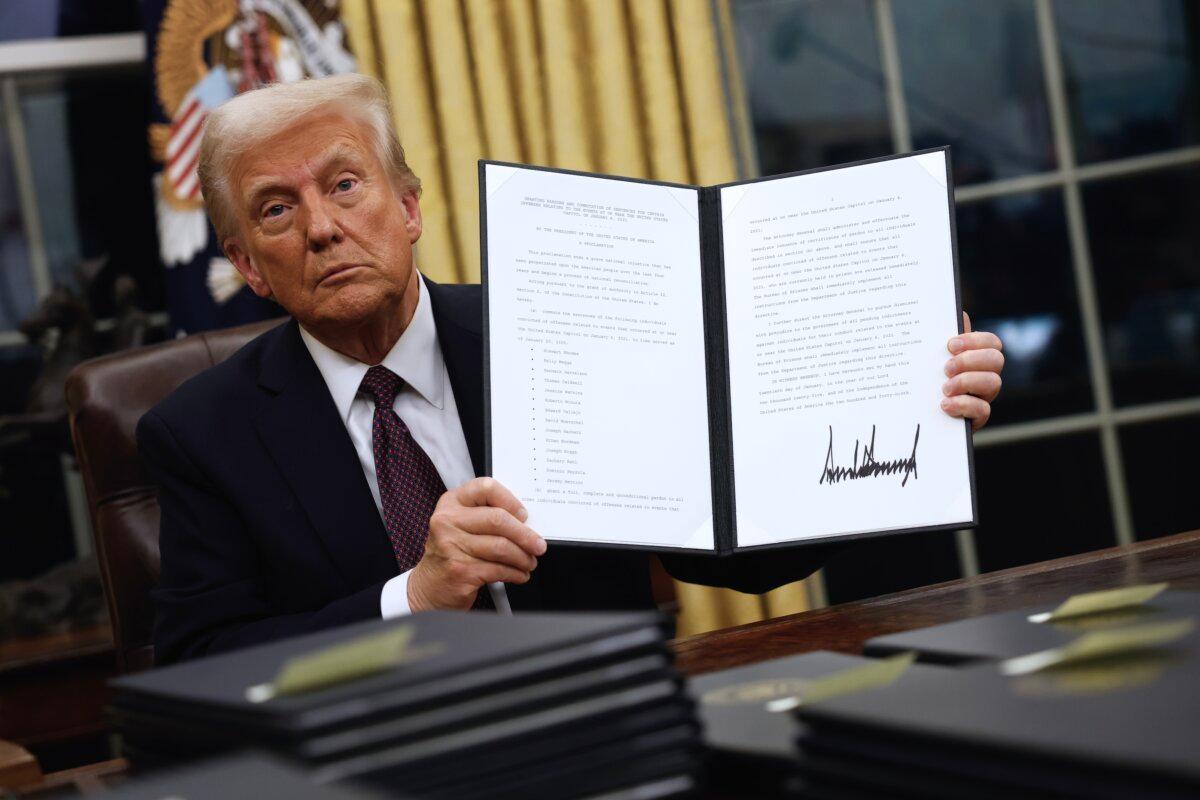
President Donald Trump signs executive orders in the Oval Office on Jan. 20, 2025 in Washington, DC. Anna Moneymaker/Getty Images
In a second address, which was not included on several press schedules for the inauguration, Trump spoke to a different group of supporters who watched the formal address on a screen at the Capitol. During this speech, the president covered some of the more contentious topics he had left out of the formal address. Coinciding with Biden’s farewell address, the major TV networks did not broadcast Biden’s concluding remarks.
Speaking before an audience at Joint Base Andrews, the former president expressed gratitude to his Cabinet and staff, calling them “the best damn team ever.”
“From what you heard in the inaugural address, we’ve got a lot more work ahead,” he remarked, jokingly crossing himself, which elicited laughter from the crowd. “I have learned through extensive experience that there are ups and downs, but we must remain steadfast.”
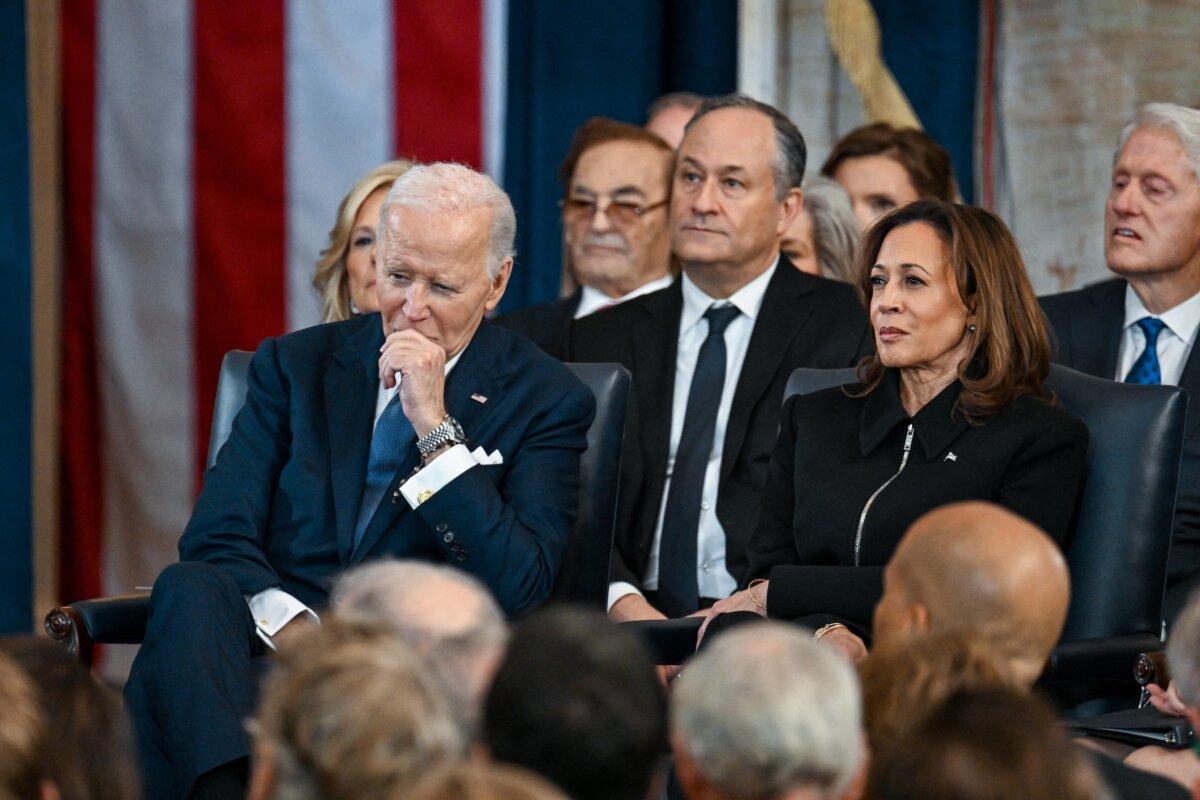
President Joe Biden and Vice President Kamala Harris listen during the inauguration of Donald Trump as the 47th president of the United States takes place inside the Capitol Rotunda of the U.S. Capitol on Jan. 20, 2025. Kenny Holston / AFP
Trump’s second address appeared spontaneous, filled with humor, and akin to his campaign rally speeches. He noted that the first lady encouraged him not to mention the pardoning of Jan. 6 detainees during the inaugural address, but promised that an order regarding that matter is forthcoming, suggesting that many would be pleased with it.
The inauguration event was relocated indoors just days prior, due to severe cold weather, with Trump delivering his address inside the Capitol and the inauguration parade moving to the Capital One Arena. Various speakers—including Musk, Virginia Governor Glenn Youngkin, and FBI Director nominee Kash Patel—addressed attendees at the arena prior to Trump’s arrival.
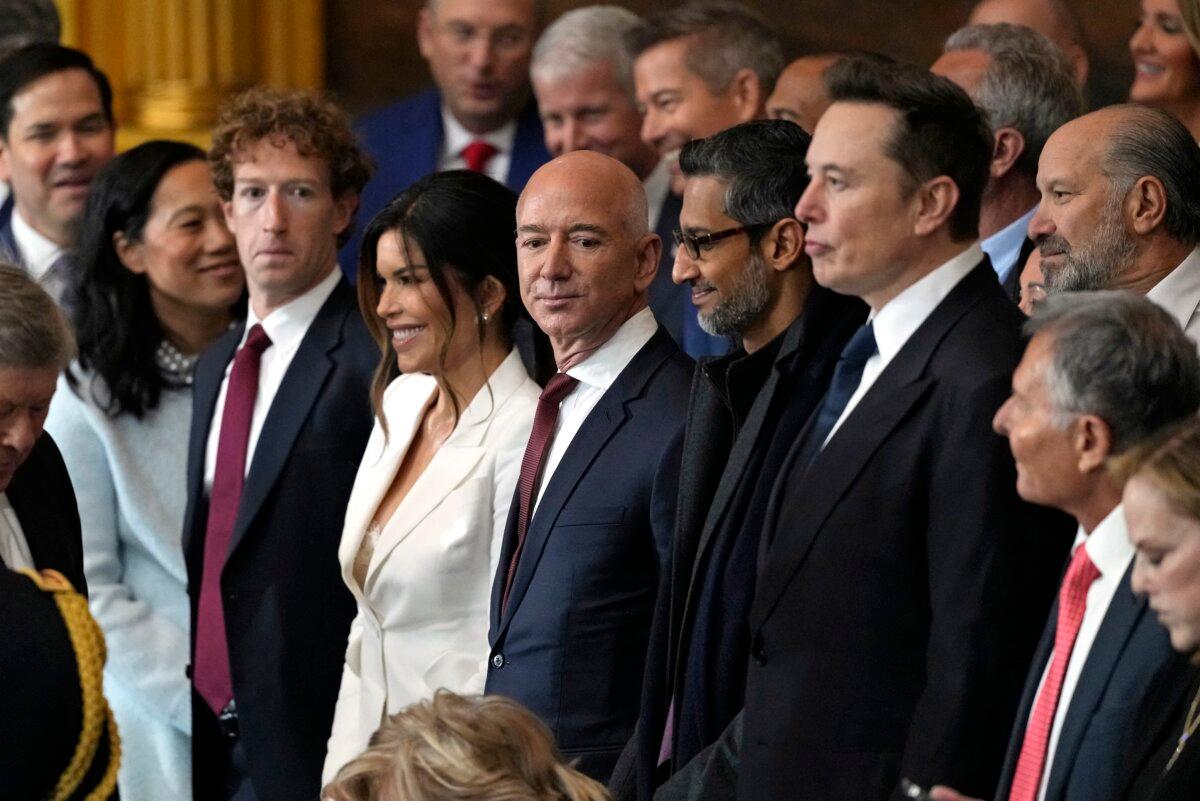
(L-R) CEO of Meta Mark Zuckerberg, Lauren Sanchez, US businessman Jeff Bezos, CEO of Alphabet Inc and Google Sundar Pichai and Tesla CEO Elon Musk attend the inauguration ceremony where Donald Trump will be sworn in as the 47th US President in the US Capitol Rotunda in Washington, DC, on Jan. 20, 2025. Julia Demaree Nikhinson / POOL / AFP
In his remarks, Patel highlighted the unacceptable rates of murder, rape, and drug overdoses. He referred to fentanyl—the synthetic opioid linked to the majority of drug overdose fatalities—as “CCP fentanyl,” referencing the Chinese Communist Party, which is largely associated with the source of fentanyl precursors.
“Our priorities have not adequately addressed the threats to our country and especially to future generations,” Patel stated. “However, starting now, that will change.”
Musk expressed his enthusiasm for the future.
“This is no ordinary victory,” Musk remarked. “This represents a pivotal moment for human civilization.”


